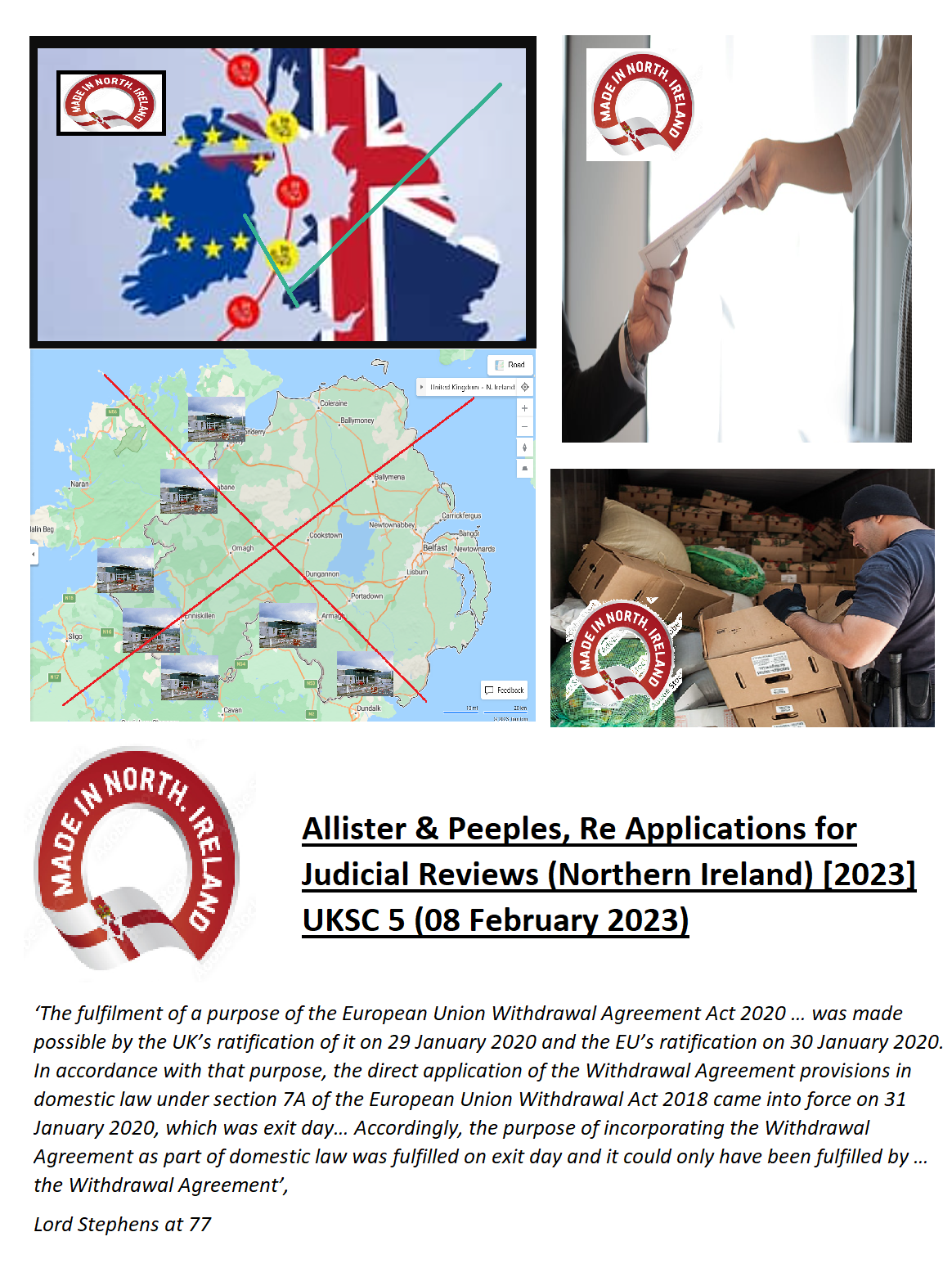Allister & Peeples, Re Applications for Judicial Reviews (Northern Ireland) [2023] UKSC 5 (08 February 2023)
Citation:Allister & Peeples, Re Applications for Judicial Reviews (Northern Ireland) [2023] UKSC 5 (08 February 2023)
Rule of thumb:If the Government enforces obligations on you to carry out when commercially trading, when can you refuse to follow these? You can refuse to follow these if you can prove that there is no valid reason behind the obligation being imposed, however, it is difficult to prove this.
Background facts:This case concerned the legality of the ‘Northern Ireland Protocol’ in the Brexit Agreement. In a nutshell, the Northern Ireland protocol is that there are no border checks on goods moving in and out between Northern Ireland and the Republic of Ireland – you can just drive with goods across the border no problem at all, so Northern Ireland is effectively still part of the EU single market despite the UK withdrawing from it. However, if there is a ferry or flight being taken from Northern Ireland to the United Kingdom, then goods have to be checked to see if the added customs on them have been paid or not. Goods from NI without the paper do not have to pay customs entering the UK, but goods from the EU do. In short the border checks on goods are from Northern Ireland moving into Britain, rather than Northern Ireland and the Republic of Ireland.
Parties argued:3 arguments were made that this arrangement was unlawful – 1) British citizens have the constitutional human right to trade under the Acts of Union, and it was argued that this was violated by NI having border checks on goods which those travelling between Scotland, England and Wales did not have. 2) It was argued that this effectively ousted Northern Ireland from the UK & made them part of the EU single market instead, which was a breach of the Good Friday Agreement and the Northern Ireland Act 1998. 3) It was argued that this breached the Brexit Act 2018 which stated that there had to be democratic agreement on the exact trade rules to be introduced, with this one introduced without the support of the people of Northern Ireland.
Court held:All 3 arguments were rejected by the UK Supreme Court. 1) It was held that there was no tariff for goods from Northern Ireland which meant their right to trade was not violated, and all goods checked anyway, so there was no adverse effect on trade. 2) NI was still a part of Britain and the UK and still had all the same rights as all other parts of the UK in addition to being part of the single market. Northern Ireland actually had a better position than the rest of the UK as they had the best of both worlds. 3) there was overall democratic support for this arrangement, which was supported by the UK Government, the EU Government and the USA Government, and this was the only possible arrangement which was workable. ‘Northern Ireland’ now effectively the ‘gateway’ & the ‘bridge’ between the United Kingdom and the EU single market.

Ratio-decidendi:
‘The fulfilment of a purpose of the European Union Withdrawal Agreement Act 2020 … was made possible by the UK’s ratification of it on 29 January 2020 and the EU’s ratification on 30 January 2020. In accordance with that purpose, the direct application of the Withdrawal Agreement provisions in domestic law under section 7A of the European Union Withdrawal Act 2018 came into force on 31 January 2020, which was exit day… Accordingly, the purpose of incorporating the Withdrawal Agreement as part of domestic law was fulfilled on exit day and it could only have been fulfilled by … the Withdrawal Agreement’, Lord Stephens at 77
Warning: This is not professional legal advice. This is not professional legal education advice. Please obtain professional guidance before embarking on any legal course of action. This is just an interpretation of a Judgment by persons of legal insight & varying levels of legal specialism, experience & expertise. Please read the Judgment yourself and form your own interpretation of it with professional assistance.

